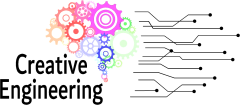Welcome to
Creative Engineering: Shaping the Future of Learning


- Design and test an interdisciplinary curriculum focused on creative engineering, applicable across technical fields.
- Support educators with teaching strategies, content, and tools for delivering creativity-focused learning experiences.
- Develop a modular e-learning platform that facilitates blended and digital learning in higher education and technical training.
- Create evaluation tools for assessing transversal skills such as innovation, reflection, and teamwork.
- Foster collaboration between universities and industry through practice-oriented learning and real-world challenges.
- Pilot the curriculum across five countries with engineering students and gather feedback for further improvement.
- Ensure open access and usability of all learning resources through a dedicated project website.


- Higher education students in engineering and related disciplines
- University teachers and trainers delivering technical and transversal skills
- Secondary and VET students preparing for technical professions
- Curriculum developers and education policymakers
- Engineering companies and industry partners looking to support future-proof skills
- Innovation centers, incubators, and training providers
- Project-based learning and digital learning communities
